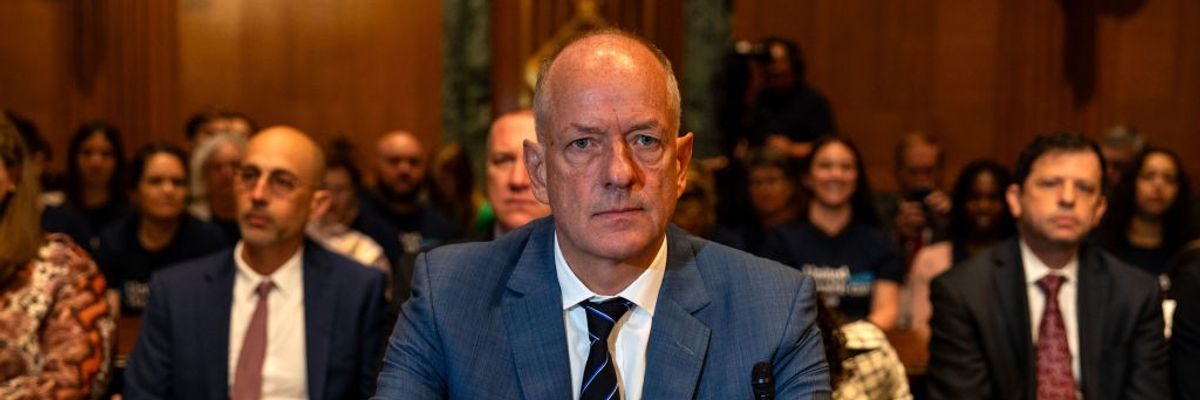UnitedHealth Group CEO Andrew Witty wrote in a New York Times op-ed Friday that the for-profit U.S. healthcare system "does not work as well as it should" and that "no one would design a system like the one we have," admissions that came as his industry faced a torrent of public anger following the murder of UnitedHealthcare's chief executive.
Witty declared that his firm, the parent company of UnitedHealthcare and the nation's largest private insurer, is "willing to partner with anyone, as we always have—healthcare providers, employers, patients, pharmaceutical companies, governments, and others—to find ways to deliver high-quality care and lower costs."
But critics didn't buy Witty's expressed commitment to reforming an industry that his company has helped shape and profited from massively. Witty was the highest-paid healthcare executive in the U.S. last year, and 40% of the private insurance industry's total profit since the passage of the Affordable Care Act has flowed to UnitedHealth Group.
"It is (barely) true that UnitedHealth didn't design the U.S. system of corporate insurance, which kills tens of thousands of people a year through denial of care," Alex Lawson, executive director of the progressive advocacy group Social Security Works, told Common Dreams. "But they certainly have perfected it and turned it into a medical murder apparatus at industrial scale. They not only block all attempts to change the system in the direction of public health, they bribe and bully with their billions in blood money to make it even crueler."
"Andrew Witty is the high priest of the temple to Moloch and Mammon, murder and money," Lawson added. "And there is no way for him to wash his hands of it, except perhaps to resign and then dedicate every dollar he has to dismantling the current system brick by brick and building one based on public health in its stead."
"Medicare for All is the only proposal on the table capable of delivering universal, continuous coverage for everyone, while also securing the efficiency and savings only possible through the elimination of private insurance."
While publicly pledging to cooperate with reform efforts, Witty has defended his company's care denials in private and urged his employees not to engage with media outlets in the aftermath of Thompson's murder.
Contrary to Witty's depiction of his company in his Times op-ed, UnitedHealth has historically been an aggressive opponent of reform efforts aimed at mitigating the harms of for-profit insurance and building public alternatives. The Leverreported in 2021 that UnitedHealth Group "held a webinar to pressure its rank-and-file employees to mobilize against efforts in Connecticut to create a state-level public health insurance option."
At the national level, UnitedHealth has spent over $5.8 million this year lobbying federal lawmakers, according to OpenSecrets.
Michael Lighty, president of HealthyCalifornia Now, offered condolences to the family of UnitedHealthcare CEO Brian Thompson in an email to Common Dreams and argued that supporters of healthcare justice must reject reform paths "controlled by economic elites such as collaborations like Andrew Witty invites."
"Our demand is actually simple: free healthcare paid for by our taxes (like firefighting). Let's build on this powerful moment of righteous outrage to change what's possible," Lighty added. "The healthcare industry needs to understand that they are not putting this genie back in the bottle: The healthcare system is a cancer that will take down anyone who defends it."
Witty, who was born in a country with a public healthcare system, did not detail the kinds of reforms he would support in his op-ed Friday, but it's clear he would oppose a transition to a single-payer system such as Medicare for All, which would effectively abolish private health insurance and provide coverage to all Americans for free at the point of service—and at a lower total cost than the status quo.
In a column for The Nation on Friday, writer Natalie Shure argued that "the appalling amount of resources and energy we put into maintaining the existence of health insurance is wasted on an industry with no social value whatsoever."
"You could eliminate every one of these corporations tomorrow and build a system without them that works better, for less money, and with less hassle," Shure wrote. "Other countries already have systems like this. Medicare for All is the only proposal on the table capable of delivering universal, continuous coverage for everyone, while also securing the efficiency and savings only possible through the elimination of private insurance."
"None of that means that murder is justified or useful," Shure added. "But anger can be. Some politicians, from Bernie Sanders, to Elizabeth Warren, to Alexandria Ocasio-Cortez, have begun to make public statements ascribing the reaction to Brian Thompson's murder to widespread fury over the health insurance industry. The next step is to harness it, and to build something new."
This story has been updated to include comment from Michael Lighty, president of HealthyCalifornia Now.

